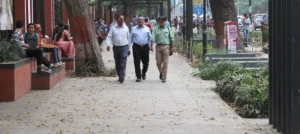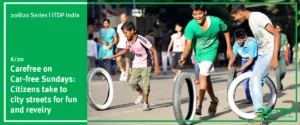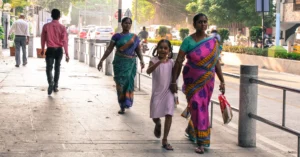Pandemic or not, women’s mobility in Indian cities has never been easy. Several factors, such as the lack of last mile connectivity, poor or no footpaths, and unreliable public transport services make everyday travel for women a nightmare. The COVID-19 pandemic and the subsequent national lockdown worsened these existing difficulties.
To understand the impact of the lockdown on women’s mobility, the ITDP India Programme conducted a study in May 2020. Through online surveys and conversations with experts working in the field of gender and urban spaces, we found that the lack of options for mobility was one of the biggest obstacles for women during the lockdown. In India, women depend more on public transport than men [1]. The lockdown and the subsequent halt to public transport operations adversely impacted their access to jobs and education.
There is an urgent need for a renewed, gendered focus on urban mobility that prioritises women and their requirements. Other than a necessary focus on improving public transport options, the pandemic has highlighted the need for affordable and sustainable options for women’s mobility to compete in a post-COVID 19 economy. Cycling can play an important role to address this as a sustainable and equitable mode of transport.
Firoza Suresh, the bicycle mayor of Mumbai, argues that providing cycles along with training programmes for women not only helps them access jobs and education, but also enhances their freedom. She shared the story of a woman who spoke on what cycling would mean for her – “It will be great if you can train me [in cycling]. I don’t have to depend on my husband. If you teach me how to cycle, I will teach it to as many women as possible. Because cycling will give us freedom, it will give us independence.”
What the lockdown did
A complete shutdown of public transport (PT) during the lockdown had a grave impact on women for several reasons. According to Census 2011, women in India make eight out of ten trips on foot, cycle, or PT. With little to no access to personal motor vehicles (unlike their male counterparts), women largely depend on public transport, like buses, sub-urban rail, and metro. In places where PT is not easily available, women rely on Informal Public Transport (IPT) which includes shared autos, mini buses, and rickshaws.
With all PT services halted, the lockdown led to unexpected social and economic consequences for women. According to Nandita Baruah, Country Representative in India of The Asia Foundation, most women who work in the informal sector faced a daunting possibility. If they were unable to get to work or took longer, due to the reduced frequency or unavailability of PT and IPT, the employers would simply choose to bring men to work.
Some cities have PT options that are expensive and unaffordable. This also impacts women more than men. Tara Krishnaswamy of the Citizens for Bengaluru pointed out that, “Urban women are always cash constrained because they do not have a cash buffer like men do. So, if you design mobility systems that have an upfront payment—like a pass—it becomes very difficult for them.” Especially with diminished family earnings, following job losses in the informal sector due to the pandemic, expensive public transport fares force women to take up low paying, riskier jobs that may require less travel.
Urban women are always cash-constrained because they do not have a cash buffer like men do. So, if you design mobility systems that have an upfront payment—like a pass—it becomes very difficult for them.
– Tara Krishnaswamy, a founding member of Citizens for Bengaluru, on expensive and unaffordable public transport
Highlighting that halting PT services impacts women disproportionately, Karen Coelho of the Madras Institute of Development Studies pointed out that women either had to depend on the men in their family for travel or drop out of the work force altogether. In a national survey conducted by the ITDP India Programme to understand people’s travel choices post-lockdown, 41 per cent of female respondents said they did not have any personal motor vehicles, compared to only 17 percent of male respondents. Underlining the significance of mobility in women’s lives, Karen Coelho argues that, “The key concept is autonomy. As long as women are not autonomous in their movement, and are dependent on male family members, they are not mobile.” There is a need to create independent avenues of transport—such as cycling—that provide social and economic mobility for women and reduce their dependence on others.
The key concept is autonomy. As long as women are not autonomous in their movement, and are dependent on male family members, they are not mobile.
– Karen Coelho, Madras Institute of Development Studies, on the significance of mobility in women’s lives
Cycles for Change
The national government has recognised cycling as an important step towards a green recovery from COVID-19. In June, the Smart Cities Mission of the Ministry of Housing and Urban Affairs launched the India Cycles4Change Challenge to inspire and support cities to implement cycling-friendly initiatives in response to COVID-19. Most importantly, it mandates cities to place the community at the centre of planning and implementation, and encourage participation from diverse groups such as women, children, and the disabled.
As part of the Challenge, cities have been working on three unique areas that will eventually increase the viability of cycling as an option for women’s mobility. These include initiatives such as training programmes to empower more women to access and use cycles, infrastructural interventions to ensure road safety and personal security, and awareness campaigns to inspire more women to cycle.
Improving access to cycles
Karen Coelho highlights the fact that cycling will work only when women have access to cycles. According to ITDP India Programme’s survey, 6 out of 10 female respondents said they knew how to ride, but only 1 had a cycle. Providing women with access to cycles through affordable and robust public bicycle sharing programmes, community cycle rental schemes, and training camps for those who need to learn cycling are the first steps to make it a viable option for women. As part of the India Cycles4Change Challenge, several cities such as Kohima, New Town Kolkata, Bhubaneswar, Mangaluru, Tumakuru, Jabalpur, Chandigarh, Ahmedabad, and Nashik have launched unique initiatives such as cycle training camps and free cycle repair clinics.





